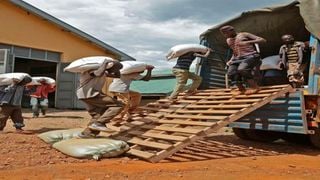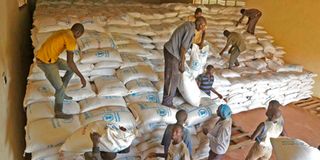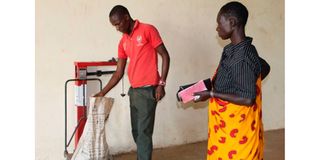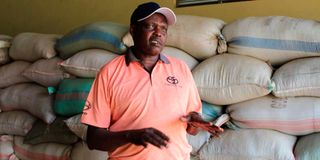
Workers load sacks of cereals into a truck from the Meguara Farmers’ Cooperative Society warehouse in Trans Mara, Narok on October 26,2021.
| Ondari Ogega | Nation Media GroupNarok
Premium
Narok's Meguara village feeding thousands of hunger-stricken people
As drought continues to ravage some parts of Kenya, a little-known location in Trans Mara, Narok County, is feeding thousands of hunger-stricken people.
Through the Meguara Farmers’ Cooperative Society, residents of Meguara have earned about Sh90 million from selling cereals.
The produce - consists maize and beans - is then sold to the World Food Programme (WFP), which then distributes it as relief food to drought-stricken families across the world.
Since time in memorial, the Maasai people have been pastoralists and move from one place to another in search of pasture for their livestock.
But this particular group of the Maasai is diversifying, and apart from keeping livestock, has embraced commercial crop farming.

Workers arrange sacks of cereals at the Meguara Farmers’ Cooperative Society warehouse in Trans Mara, Narok on October 26, 2021.
The group has ventured into agribusiness, where they just don't farm for the sake of it but for profit.
Retired chief Simon Koiseta says that to make it easier to sell their produce, they came together as community members, put their food products together and stored them as they awaited a 'good' market.
"This week, we have received payment of over Sh78 million from the sale of beans to WFP," said Mr Koiseta, noting that they sold 10,000 bags of beans of 90kg each.
Each bag went for Sh7,820 after they repackaged them in WFP sacks, where they got 18,000, 50kg bags.
When the Nation visited Meguara last week, 23 long trucks had lined up, ready to receive and transport the WFP consignments to northern Kenya, which has been ravaged by drought.
After repackaging, the produce becomes the property of WFP, a leading humanitarian organisation in the world that saves and changes lives, delivers food assistance in emergencies and works with communities to improve nutrition and build resilience.

Retired Chief Simon Koiseta, a founding member of Meguara Farmers’ Cooperative Society inside one of their warehouses in Trans Mara, Narok on October 26, 2021.
In June this year, Meguara farmers sold 5,000 bags of 90kg maize. They earned over Sh10 million, with each bag going for Sh3,500.
Mr Koiseta, who retired as a senior chief last year, said he is now engaging full-time in the cereal business and has organised his community so that members can farm for business and profit.
The cooperative society started in 2005 but picked up in 2007.
It now has 280 members, but some are inactive.
Members alternate between beans and maize, depending on seasons.
"WFP does not buy our produce always. When they do not buy, we sell to schools, cereal shops, millers and other markets," said Mr Koiseta, noting that the trick is to wait for good market prices.

Ms Lilian Sere, a member of Meguara Cooperative in Trans Mara West Sub County looks on as her maize is being weighed.
He explained that they put the cereals together in their stores in Meguara after drying and treatment so that they can last long.
"God has blessed us with food. We stock and when there is a good market we sell. We just don't sell anytime. We wait when the market is good. Not all members of our association are active," said Mr Koiseta.
He noted that the beans they sold last week were stored in April.
"We have kept those beans for six months now. We were waiting to get a good market. We got it from WFP, who usually float tenders when they are ready to buy the food. We won a tender as a cooperative," he said.

Romosha Assistant Chief Simon Koiseta in one of the cereals stores for Meguara Cooperative in Trans Mara West Sub County.
The Meguara society has traded with WFP since 2009.
Mr Koiseta said they were linked to WFP by the Kenya Cereals Growers Association.
He is now the association's chairman in Trans Mara West and East and is also a member at the county and national levels.
"By putting our produce together and selling it as a group, we avoid brokers and middlemen who exploit farmers. Each year, we supply maize and beans. For WFP, it depends on whether they have a budget to purchase our cereals," noted Koiseta.
He noted that WFP offers good prices for their cereals compared with other buyers.
"The local markets are a bit low. For example, a 90kg bag of beans in our local market sells for about Sh5,000 while WFP offers over Sh7,000," he said.
After delivering the produce, farmers wait for only two weeks before receiving their pay.





